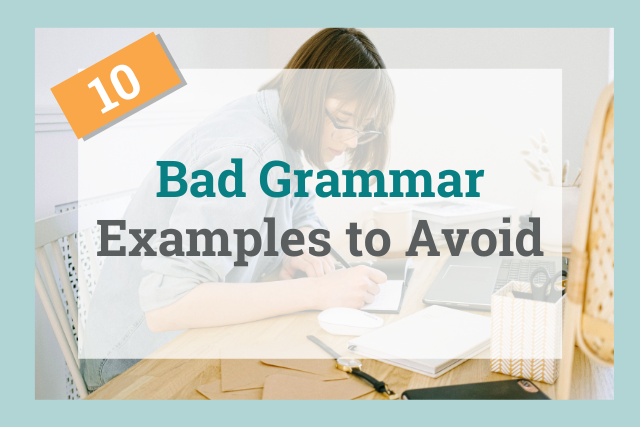
What are the worst grammatical errors you can make? Keep reading to check out our top ten bad grammar mistakes.
- Why Good Grammar Matters
- 1. Subject–Verb Agreement
- 2. Pronoun–Antecedent Agreement
- 3. Verb Tenses
- 4. Double Negative Phrases
- 5. Dangling and Misplaced Modifiers
- 6. Confused Homophones
- 7. Bad Sentence Structure
- 8. Punctuation Errors
- 9. Verbose Sentences and Tautologies
- 10. Mixed-Up Pronouns
- How to Avoid Bad Grammar Mistakes
Why Good Grammar Matters
Why should you care about using correct grammar? The written language is one of the major ways we communicate our ideas.
Grammar is a set of rules and guidelines that make our writing clear and standardized. Good English grammar helps us portray our thoughts, opinions, and ideas in a logical way that everyone can understand.
Improper grammar leads to miscommunication. Good grammar is important for communicating ideas in academic writing, in the workplace, and in creative writing.
What are some of the most common grammar mistakes? Let’s dive into the top ten examples of bad grammar.
1. Subject–Verb Agreement
One of the worst grammatical errors is incorrect subject–verb agreement. It’s important to make sure that the subject and the verb go together.
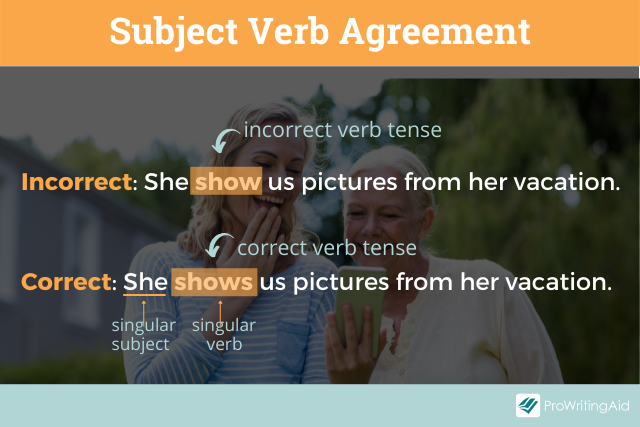
You can think of it like a matching game. Always use plural verb forms when your subjects are plural nouns. When the subject and the verb match, they agree. When they don’t agree, it doesn’t look or sound right to the reader.
When we conjugate verbs in English, we almost always write the third-person singular present tense form differently from other forms. With certain irregular verbs, such as be, we write all the present tense forms differently from each other.
Let’s take a look at a few examples.
- Incorrect: We runs a half-marathon every November.
- Correct: We run a half-marathon every November.
- Incorrect: She show us pictures from her vacation.
- Correct: She shows us pictures from her vacation.
Things get trickier with the verb be. First person, second person, and third person singular are all written differently.
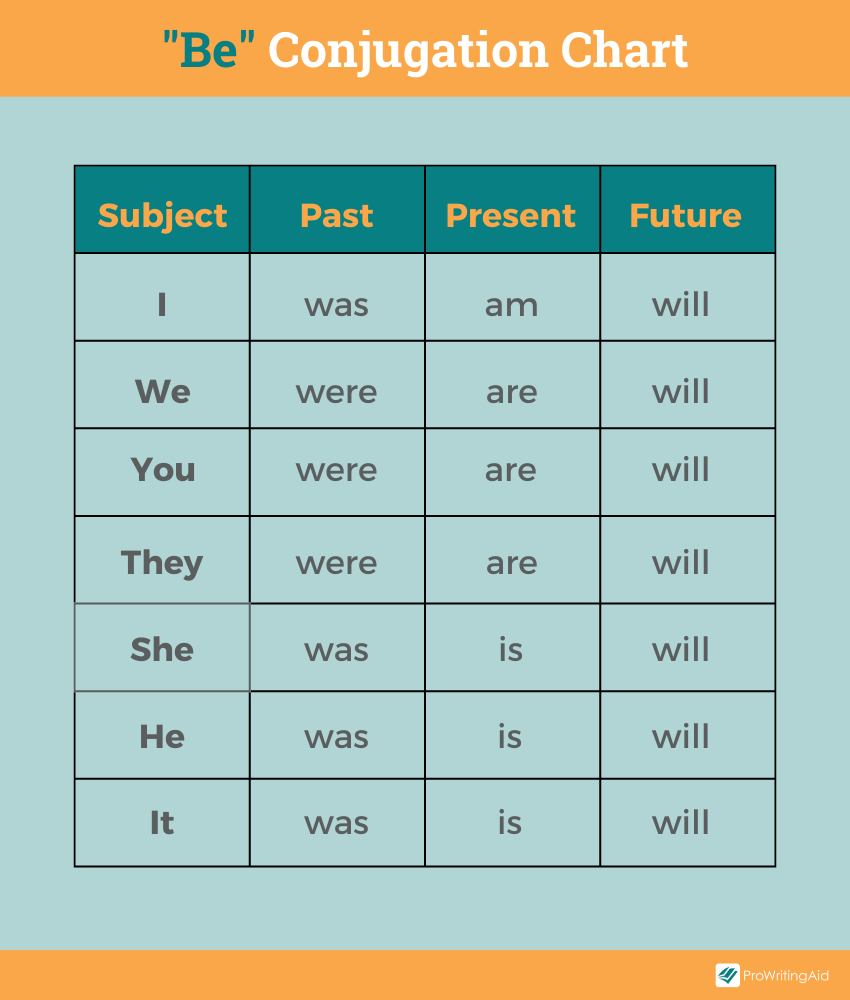
Here are some examples.
- Incorrect: I is going to the store.
- Correct: I am going to the store.
- Incorrect: You is my best friend.
- Correct: You are my best friend.
- Incorrect: She are a customer service representative.
- Correct: She is a customer service representative.
It’s easy to fix your subject–verb agreement issues. Read your sentences aloud to listen for mistakes. Agreement issues usually sound “wrong” when read out loud. ProWritingAid is also a quick, easy way to check for subject–verb agreement.
2. Pronoun–Antecedent Agreement
Subjects and verbs aren’t the only things that need to agree in English! Another bad grammar mistake is mixing up pronouns and antecedents.
An antecedent is the noun that a pronoun refers to. Pronoun–antecedent agreement includes matching gender and number or amount of items.
Here’s a simple example:
- Incorrect: President Biden delivered her speech from the Rotunda.
- Correct: President Biden delivered his speech from the Rotunda.
In this situation, President Biden is one male, so we use the pronoun "his."
Things get trickier with indefinite pronouns, compound subjects, and collective nouns.
Here is an example of each:
- Incorrect (indefinite pronoun): Each teacher went to their room.
- Correct (indefinite pronouns): Each teacher went to his or her room.
- Incorrect (compound subject): Kim and Khloe visited her family.
- Correct (compound subject): Kim and Khloe visited their family.
- Incorrect (collective noun): The team lost to their opponent.
- Correct (collective noun): The team lost to its opponent.
The rules vary from type of pronoun and individual situation. If you aren’t sure, use a grammar checker or look up the rule to avoid making this bad grammar mistake.
3. Verb Tenses
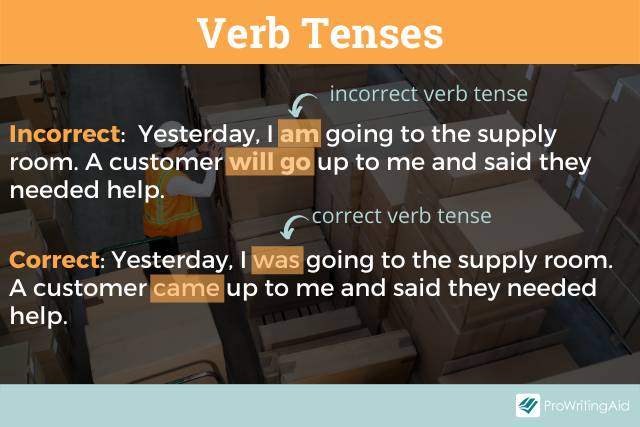
Mixing up verb tenses and moods is another common grammatical error people make. Verbs come in several tenses and moods. Make sure you’re using the correct one for what you’re talking about.
First, you must decide if you’re talking about the past, present, or future. Then you’ll need to determine if you’re talking about an ongoing action or a one-time event. This will help you determine which verb form to use.
Let’s say you’re emailing your boss about an incident that happened at work. You need to write in one of the past tense forms.
- Incorrect: Yesterday, I am going to the supply room. A customer will go up to me and said they needed help.
That incorrect example used the present continuous tense, the future tense, and the simple past tense to describe something that happened in the past. Here’s what it should look like.
- Correct: Yesterday, I was going to the supply room. A customer came up to me and said they needed help.
Now we have the past continuous and simple past tenses. These are correct for describing an event that occurred the day before.
4. Double Negative Phrases
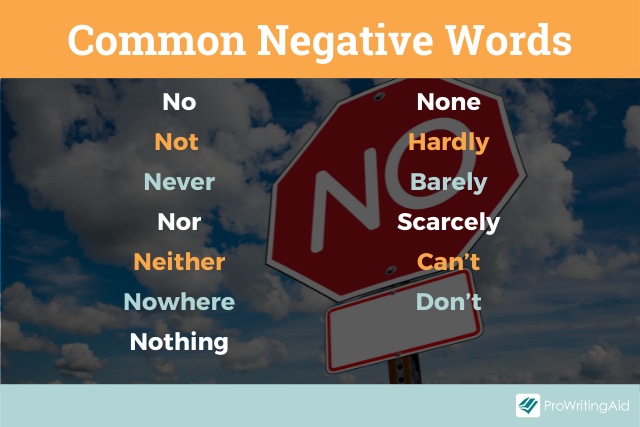
In the English language, using two negative words is a grammar error. We call these double negatives. You should only use one negative word in a phrase to show negation.
The most common negative words are no and not. There are also words that use no as a root word, like nothing, none, nor, and nowhere. But there are other negative words in English, too, such as neither, hardly, barely, never, or scarcely. Be aware of any negatives that are hiding in contractions, like don’t or can’t.
The only exception is that neither and nor are used together when talking about two things (e.g. neither here nor there).
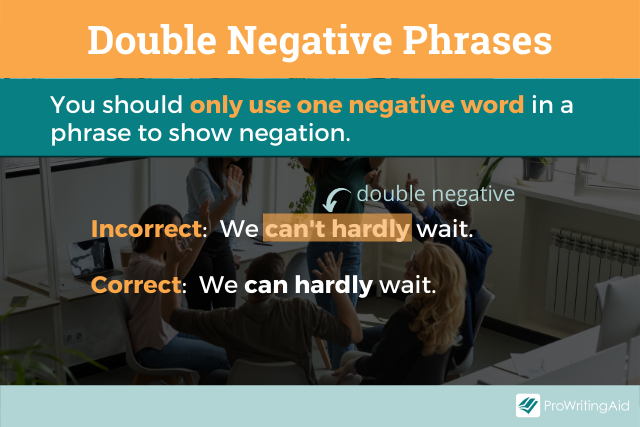
Here are a few examples of how to use negative words correctly.
- Incorrect: I can’t get no satisfaction
- Correct: I can get no satisfaction. OR I can’t get any satisfaction.
- Incorrect: He’s not going nowhere.
- Correct: He’s going nowhere. OR He’s not going anywhere.
- Incorrect: We can’t hardly wait.
- Correct: We can hardly wait.
In some informal situations or among certain cultures, double negatives are acceptable. However, in standard formal English, using double negatives is considered bad grammar.
5. Dangling and Misplaced Modifiers
Another example of bad grammar is misusing modifiers. There are two ways that modifiers can be used wrongly: when they are dangling or misplaced.
What’s a modifier? It’s an optional word or phrase that modifies another element in a sentence. You should always place a modifier as close to the element it’s modifying as possible. Otherwise, you might leave your reader scratching their heads.
A dangling modifier is a modifier that references nothing in the sentence. It’s as if the element it’s supposed to modify was forgotten, so the sentence is unclear.
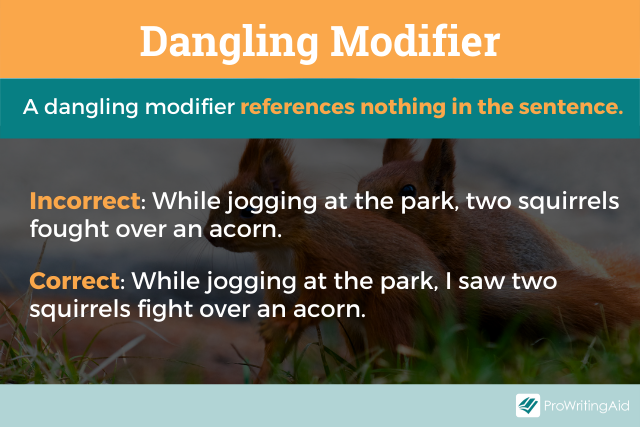
- Incorrect: While jogging at the park, two squirrels fought over an acorn.
The squirrels weren’t jogging at the park, but the sentence doesn’t mention who was jogging!
Here’s how to fix it.
- Correct: While jogging at the park, I saw two squirrels fight over an acorn.
A misplaced modifier is a little different. The element that needs to be modified is present, but the modifier appears to modify something else.
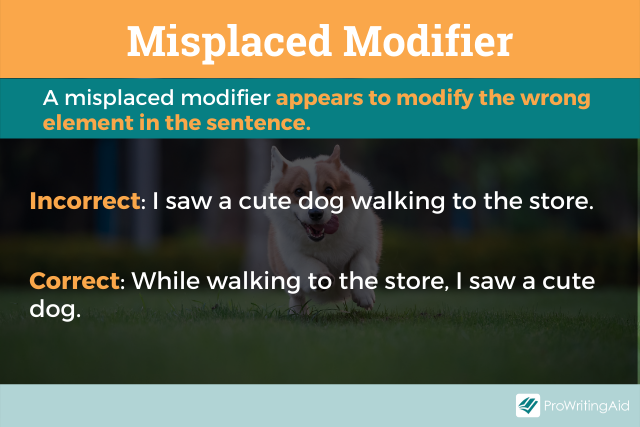
- Incorrect: I saw a cute dog walking to the store.
Is the cute dog walking to the store? Probably not. There are a few ways you can fix this sentence to make the modifier clearer.
- Correct: While walking to the store, I saw a cute dog.
- Correct: I saw a cute dog while walking to the store.
- Correct: I saw a cute dog when I was walking to the store.
A squinting modifier is a type of misplaced modifier that might refer to the word or words before or after the modifier. It makes you squint at the sentence to figure out what is being modified.
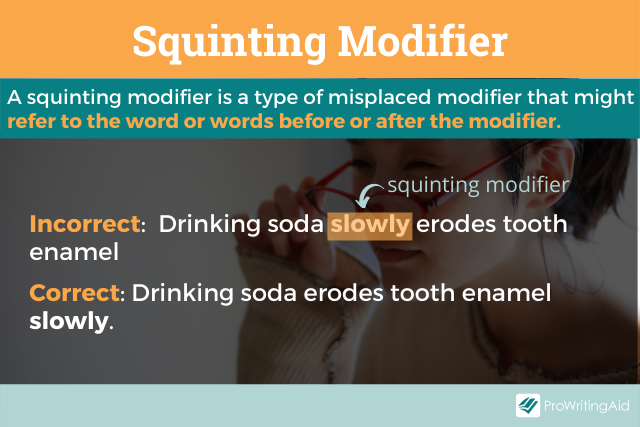
Here’s an example.
- Incorrect: Drinking soda slowly erodes tooth enamel.
It’s not clear whether the adverb “slowly” refers to drinking soda or erodes. If you drink your soda quickly, will your tooth enamel still erode? Here’s how we can fix this squinting modifier.
- Correct: Drinking soda erodes tooth enamel slowly.
Even though we moved the modifier “slowly” further from “erodes,” it’s much clearer than before.
6. Confused Homophones
Spelling errors can fall under the bad grammar umbrella, especially when you confuse homophones. Homophones are words that sound the same but are spelled differently.
It’s important to use the correct word in your writing, but homophones make this tricky. There are a few common homophones that people mix up often.
Here are a few of them.
- your/you’re
- there/their/they’re
- to/two/too
- here/hear
- are/our
- buy/by
- which/witch
- affect/effect
When you’re using any of these words, always double check your meaning. If you don’t have the time to do this, ProWritingAid’s Homonym Report can help catch these sneaky words and keep your writing clear of errors.
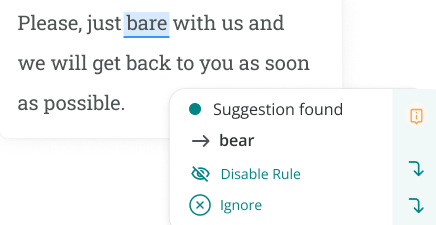
Keep your writing error-free with a free ProWritingAid account.
7. Bad Sentence Structure
Often, bad grammar is synonymous with bad sentence structure. There are two main ways that you can write a sentence that has bad grammar. We’ll talk about each of these ways in more detail.
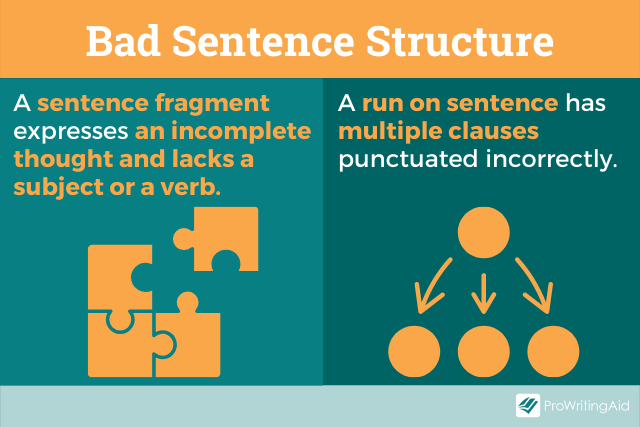
First, there are sentence fragments. A sentence must make complete sense by itself. This means that a sentence needs, at the very least, a subject, a verb, and a complete thought. Without these, the phrase is a sentence fragment.
- Incorrect: Went to the store.
- Correct: He went to the store.
- Incorrect: A pretty girl named Susan.
- Correct: A pretty girl named Susan sits behind me in class.
There are situations where we use sentence fragments, especially in speech, but they are not appropriate for formal writing.
The second way to have poor sentence structure is with run-on sentences. Run-on sentences are sentences with multiple clauses that are not punctuated correctly with commas or other punctuation marks.
- Incorrect: He went to the store he needed to buy groceries because he was out of food but then he decided to also buy some cleaning supplies which he needed to clean the kitchen.
There are several ways you could rewrite this run-on sentence correctly.
Here’s one way:
- Correct: He went to the store; he needed to buy groceries because he was out food. Then he decided to also buy some cleaning supplies, which he needed to clean the kitchen.
Those punctuation marks are important to make the sentences easy to comprehend.
8. Punctuation Errors
Our next type of grammar mistake has to do with punctuation errors. We already talked about how run-on sentences don't use punctuation correctly. But what about regular sentences?
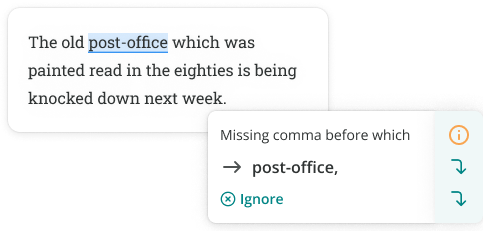
First, it’s important to always use the correct end mark. A period is used for declarative sentences, question marks are used for questions, and exclamation points are used for exclamatory statements.
Here’s an example:
- Incorrect: Do you know Bob.
- Correct: Do you know Bob?
Other punctuation errors might include forgetting to use quotation marks for quotes, using extra dots in an ellipsis, or mixing up hyphens and dashes.
9. Verbose Sentences and Tautologies
Wordiness is another bad grammar mistake. Even if a sentence follows all the mechanics of grammar, it can be too verbose and use complicated words. An unnecessarily wordy sentence is often called an inflated sentence. Most of the time, simpler is better.
- Incorrect: When you arrive at your domicile from your place of work, please prepare fresh cuisine for the late evening meal, which is necessary for sustenance.
- Correct: When you get home from work, please make dinner.
A tautology is a specific type of wordiness. It means to express the same idea twice. Tautologies make sentences redundant. While they can be useful in creative writing for emphasis when used sparingly, they add unneeded words in most types of writing.
- Incorrect: My heart beat erratically in my chest.
- Correct: My heart beat erratically.
Your heart always beats in your chest, so that phrase is unnecessary.
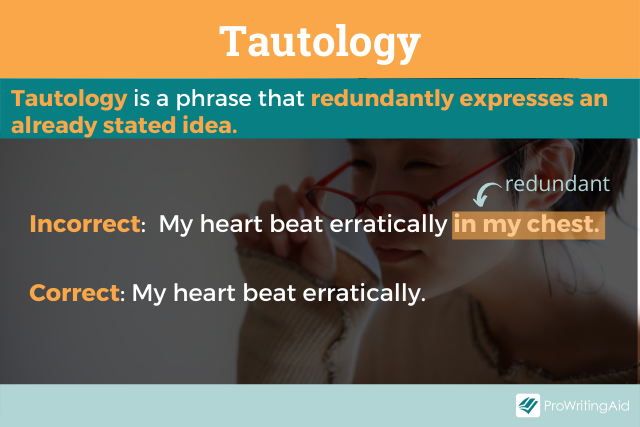
10. Mixed-Up Pronouns
Our final grammar error is mixing up pronouns. In English, we have subject pronouns, object pronouns, possessive adjectives, possessive pronouns, and reflexive pronouns. Mixing up these pronouns is a bad grammar mistake you want to avoid.
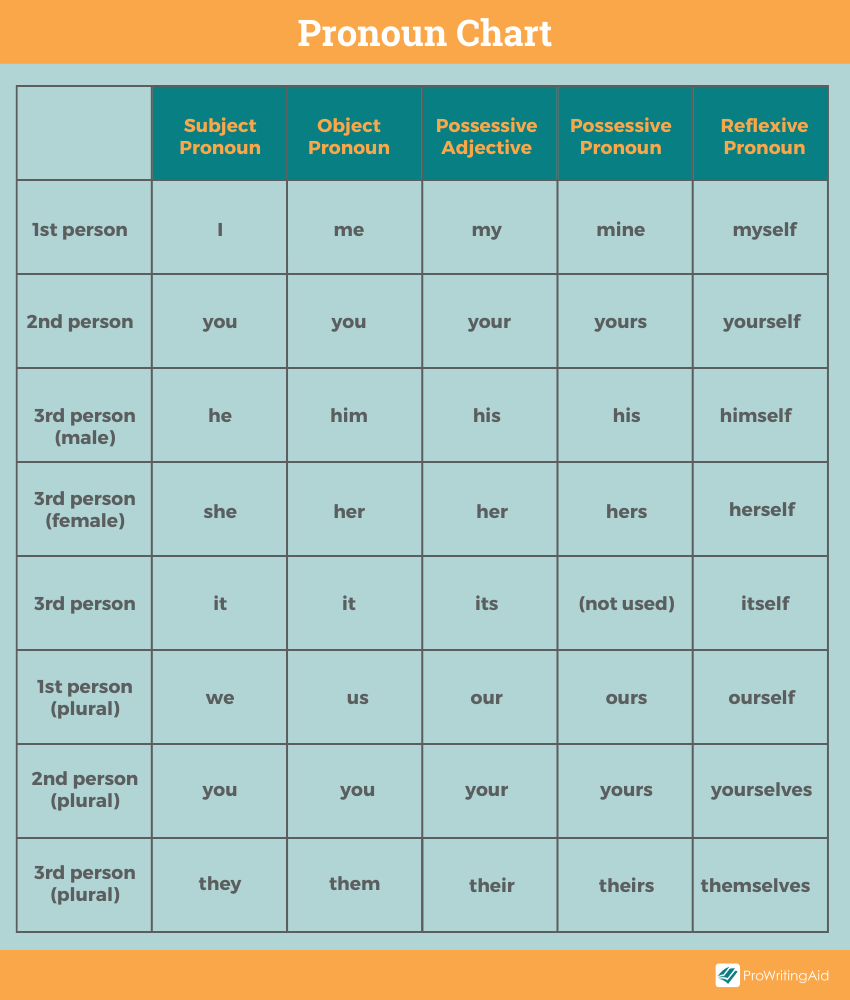
- Incorrect: My mother and me went to the zoo.
- Correct: My mother and I went to the zoo.
- Incorrect: This is a photo of she and I.
- Correct: This is a photo of her and me.
The pronouns they/them/their/theirs sometimes act as singular pronouns, and they have been since at least the fourteenth century. However, you should still use the third-person plural verb forms when you use the singular “they.”
Pay attention to whether you are discussing the subject or the object of a sentence to determine which pronoun to use.
How to Avoid Bad Grammar Mistakes
Even the best writers make mistakes! And there are so many grammatical rules to keep track of. With a quick proofread, you can avoid making these grammatical errors and others in your own writing.


